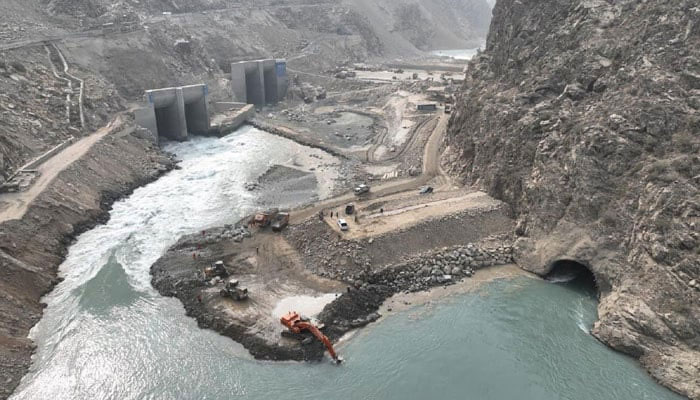Amid energy overcapacity concerns: Govt reviews hydel, nuclear power projects
Review aims to assess viability and efficiency of these power projects as country faces surplus energy production
ISLAMABAD: The government is conducting a review of existing and upcoming power projects, including hydropower and nuclear plants, in response to concerns over energy overcapacity and pricing. The review aims to assess the viability and efficiency of these power projects as the country faces surplus energy production. Officials have stressed the need to optimize power generation to align with current demand and ensure economic sustainability. Overcapacity has led to financial strain, including high capacity payments to IPPs for unused power.
Minister for Power Awais Leghari briefed the Senate Standing Committee on Power during a meeting chaired by Senator Mohsin Aziz. The minister said, “We are also reviewing the committed projects, even Bhasha and C5, for which we are committed and have already issued letters of support.” The C5 project refers to the 1,200 MW Chashma Nuclear Power Plant Unit 5.
Leghari added that a task force is currently assessing the IPPs, and he expects to provide the committee with a detailed outcome and realistic timeframe within the next two weeks.
Under the Integrated Generation Capacity Expansion Plan (IGCEP), about 18,000 MW of new capacity is expected over the next ten years, with the majority from hydropower. “But we are also challenging them. We want to go towards least cost,” Leghari said, highlighting a shift towards more economical energy solutions. The minister also mentioned that many of these IPP agreements are under sovereign guarantees, making unilateral changes difficult. “We are responsibly studying it to identify the fault lines, how to fix them, and reduce the price,” he said.
Leghari stated that IPPs would be categorized into three groups. Those with agreements expiring in three to four years and deemed unnecessary may be asked to exit, with compensation for their return on equity (RoE) based on the net present value of the remaining contract period. “Soon, we will get good news,” Leghari added, hinting at forthcoming developments in the energy sector. “We want to terminate IPPs that are no longer needed, but we cannot do so unilaterally,” Leghari stated.
The panel while expressing concern on the IPPs agreements what it called faulty and overpriced, asked the Power Division to provide the regional comparison, heat audit and Return on Equity (RoIs) of projects which have been burdening the power consumers. In the meeting, several critical issues related to IPPs were discussed. The committee has requested copies of all agreements signed with IPPs since 1992. It asked for briefing on the per-unit electricity production costs from these IPPs, as well as a comparison of these costs with those in other regional countries. Detailed records of capacity payments made to IPPs over the past 20 years were also sought.
-
 Royal Expert On Andrew, Sarah Ferguson’s ‘entitled’ Behaviour Since Marriage
Royal Expert On Andrew, Sarah Ferguson’s ‘entitled’ Behaviour Since Marriage -
 Instagram And YouTube Accused Of Engineering Addiction In Children’s Brains
Instagram And YouTube Accused Of Engineering Addiction In Children’s Brains -
 Trump Reached Out To Police Chief Investigating Epstein In 2006, Records Show
Trump Reached Out To Police Chief Investigating Epstein In 2006, Records Show -
 Keke Palmer Praises Actor Who Inspired 'The Burbs' Role
Keke Palmer Praises Actor Who Inspired 'The Burbs' Role -
 Humans May Have 33 Senses, Not 5: New Study Challenges Long-held Science
Humans May Have 33 Senses, Not 5: New Study Challenges Long-held Science -
 Kim Kardashian Prepared To Have Child With Lewis Hamilton: 'Baby Using A Surrogate'
Kim Kardashian Prepared To Have Child With Lewis Hamilton: 'Baby Using A Surrogate' -
 Internet Splits Over New York's Toilet Data Amid Bad Bunny's Super Bowl Show
Internet Splits Over New York's Toilet Data Amid Bad Bunny's Super Bowl Show -
 Prince William Inspects Saudi Arabia's Efforts To Promote Football In Young Girls
Prince William Inspects Saudi Arabia's Efforts To Promote Football In Young Girls -
 Northern Lights: Calm Conditions Persist Amid Low Space Weather Activity
Northern Lights: Calm Conditions Persist Amid Low Space Weather Activity -
 'Look What Andrew Has Done': Meghan Markle Defended On Jeremy Vine Show
'Look What Andrew Has Done': Meghan Markle Defended On Jeremy Vine Show -
 Apple, Google Agree To Make 'app Store' Changes Over UK Regulator Concerns
Apple, Google Agree To Make 'app Store' Changes Over UK Regulator Concerns -
 Autodesk Files Lawsuit Against Google Over AI Video Tool Trademark Dispute
Autodesk Files Lawsuit Against Google Over AI Video Tool Trademark Dispute -
 San Francisco 49ers Player Shot Near Post-Super Bowl Party
San Francisco 49ers Player Shot Near Post-Super Bowl Party -
 Kardashian-Jenner Clan Brings Lewis Hamilton Into The Fold: Watch
Kardashian-Jenner Clan Brings Lewis Hamilton Into The Fold: Watch -
 Meghan Markle 'quietly Dreaded' As Ex-best Friend Receives Lucrative Offer For Bombshell Memoir About Duchess
Meghan Markle 'quietly Dreaded' As Ex-best Friend Receives Lucrative Offer For Bombshell Memoir About Duchess -
 Blake Shelton, Gwen Stefani Make Big Move To Save Their Marriage
Blake Shelton, Gwen Stefani Make Big Move To Save Their Marriage




